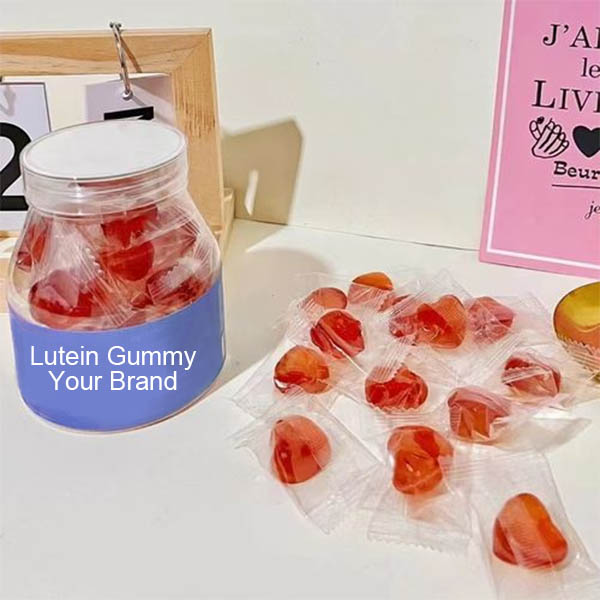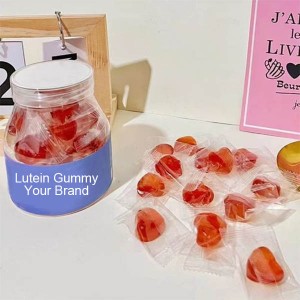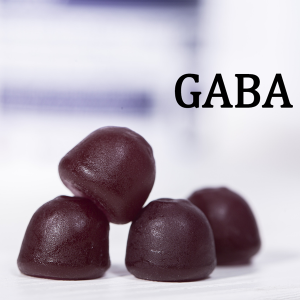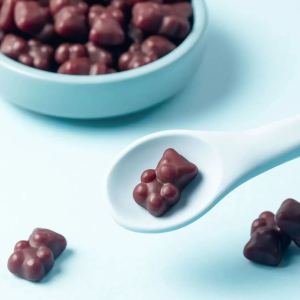| Basic Information | |
| Product name | Lutein Gummies |
| Other names | Lutein and Zeaxanthin Gummy,Lutein Eyes Gummy,Eye Gummy,Bilberry and Lutein Gummy,etc. |
| Grade | Food grade |
| Appearance | As the customers requirements.Mixed-Gelatin Gummies, Pectin Gummies and Carrageenan Gummies.
Bear shape, Berry shape, Orange segment shape, Cat paw shape, Shell shape, Heart shape, Star shape, Grape shape and etc. are all available. |
| Shelf life | 12-18 months, subject to store condition |
| Packing | As customers' requirements |
| Condition | Preserve in tight containers,protected from light. |
Description
Lutein is one of two major carotenoids found in the human eye (macula and retina).
It is thought to function as a light filter, protecting the eye tissues from sunlight damage.
Lutein is commonly taken by mouth to prevent eye diseases, including cataracts and a disease that leads to vision loss in older adults (age-related macular degeneration or AMD).
Lutein and zeaxanthin are two important carotenoids, which are pigments produced by plants that give fruits and vegetables a yellow to reddish hue.
They’re structurally very similar, with just a slight difference in the arrangement of their atoms.
Function
Lutein and zeaxanthin are powerful antioxidants that defend your body against unstable molecules called free radicals.
In excess, free radicals can damage your cells, contribute to aging and lead to the progression of diseases like heart disease, cancer, type 2 diabetes and Alzheimer’s disease .
Lutein and zeaxanthin protect your body’s proteins, fats and DNA from stressors and can even help recycle glutathione, another key antioxidant in your body .
Additionally, their antioxidant properties may reduce the effects of “bad” LDL cholesterol, thus decreasing plaque build-up in your arteries and reducing your risk of heart disease .
Lutein and zeaxanthin also work to protect your eyes from free radical damage.
Your eyes are exposed to both oxygen and light, which in turn promote the production of harmful oxygen free radicals. Lutein and zeaxanthin cancel out these free radicals, so they’re no longer able to damage your eye cells.
They support eye health
Lutein and zeaxanthin are the only dietary carotenoids that accumulate in the retina, particularly the macula region, which is located at the back of your eye.
Because they’re found in concentrated amounts in the macula, they’re known as macular pigments.
The macula is essential for vision. Lutein and zeaxanthin work as important antioxidants in this area by protecting your eyes from harmful free radicals.
Below are some conditions with which lutein and zeaxanthin may help:
Age-related macular degeneration (AMD): Consumption of lutein and zeaxanthin may protect against AMD progression to blindness .
Cataracts: Cataracts are cloudy patches at the front of your eye. Eating foods rich in lutein and zeaxanthin may slow their formation .
Diabetic retinopathy: In animal diabetes studies, supplementing with lutein and zeaxanthin has been shown to reduce oxidative stress markers that damage the eyes.
Retinal detachment: Rats with retinal detachments who were given lutein injections had 54% less cell death than those injected with corn oil .
Uveitis: This is an inflammatory condition in the middle layer of the eye. Lutein and zeaxanthin may help reduce the inflammatory process involved .
Having enough lutein and zeaxanthin is still crucial to your overall eye health.
May protect your skin
Only in recent years have the beneficial effects of lutein and zeaxanthin on skin been discovered.
Their antioxidant effects allow them to protect your skin from the sun’s damaging ultraviolet (UV) rays .
Medically reviewed by Amy Richter, RD, Nutrition — By Sharon O'Brien MS, PGDip — Updated on June 13, 2023
Applications
1. People with diabetes: Generally, people with diabetes are more prone to retinopathy than normal people, and lutein can play a very good role in prevention and health care for this kind of people.
2. Adolescents: Adolescents are in the period of eyeball development and the busy period of their studies. If the intake of lutein in the body is insufficient or excessive at this time, it will cause damage to the eyes. Appropriate intake of lutein can play a very good role in preventing myopia and amblyopia.
3. Elderly people: The elderly people are prone to eye diseases such as glaucoma and cataract due to the transformation of various organs of the body, and lutein can absorb blue light and resist oxidation. It can prevent eye diseases in the elderly population very well.









